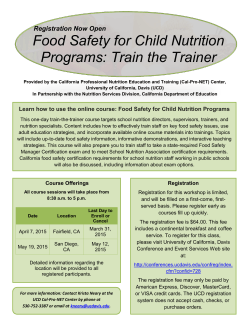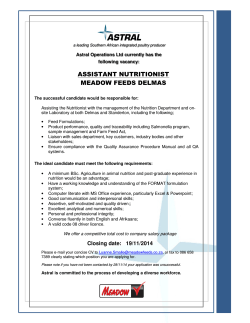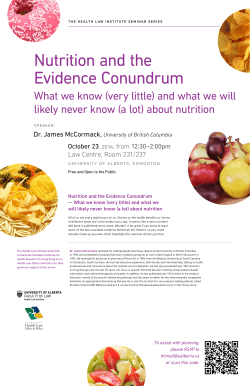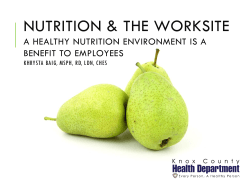
Call for Papers - Ministry of Agriculture, Livestock and Fisheries
Ministry of Agriculture, Livestock and Fisheries. CALL FOR PAPERS NATIONAL CONFERENCE ON FOOD AND NUTRITION SECURITY Theme: Feeding Kenya 2015 and beyond - whose responsibility? Kenya committed herself to the Millennium Development Goal (1) to eradicate extreme poverty and hunger by 2015. Furthermore, the constitution of Kenya identifies the need for access to food as a basic human right as outlined in article 43(1)(C) and as such every person has the right to be free from hunger and to have adequate food of acceptable quality. However, due to the rapidly growing population and impact of climate change, the challenge of feeding the country is increasingly becoming a major concern. In addition, food insecurity has been aggravated by a number of factors, including poor land management practices , low agricultural productivity, over reliance on rainfed agriculture, low mechanization, unexploited irrigation potential, climate variability and low access to extension services. Other contributing factors include high and volatile commodity prices, high post-harvest losses, inadequate targeted social protection programmes, insecurity, and weak agriculture information and early warning systems. Recent statistics indicate that an estimated 44% of the country’s population live below the poverty line and about 7.5 million people are described as chronically food insecure out of which about 1.5 million require food aid at any one time. During periods of shock such as drought and floods, the number of people requiring food aid rises to between 2.5 to 3.5 million. On malnutrition, it is estimated that about 29 percent of children under five years are stunted, 7 percent are wasted, while 16 percent are underweight. These figures are five times higher than world malnutrition index for children under five. In order to address food insecurity, the government together with stakeholders developed a national food and nutrition security policy through a consultative process which identified key issues affecting food and nutrition security in the country. The conference therefore seeks to bring together producers, pastoralists, researchers, extension agents, marketers, professionals from the academia, civil society, policy makers, private sector and development partners to discuss the sub themes outlined below; Sub-theme 1: National food and nutrition Security in the wake of devolution 1 Sub-theme 2: Food and nutrition security in relation to youth, agriculture and vulnerable groups. women in Sub-theme 3: Infrastructure and technology in supporting sustainable food production, distribution, post harvest and marketing systems ; Sub-theme 4: Research, academia and extension in food and nutrition security Sub theme 5: Private Sector opportunities in food and nutrition security Subtheme 6: Water and health in the quest for a food secure Kenya. Sub theme 7: New challenges ; Environmental issues, climate smart technologies, exploitation of Natural Resources; urbanization Sub theme 8: The pricing regime for inputs, produce and products. Sub theme 9: Social Protection, safety nets, targeted subsidies, vulnerability reduction and insurance services. The proposals will need to be aligned to one or a number of the above subthemes. Given the increasing challenge of food insecurity, the presentation should take into consideration a practical approach that is able to propel the country towards Zero Hunger. Papers which offer pragmatic solutions will receive a higher rating. The agriculture sector therefore wishes to invite interested individuals/groups to submit papers to be presented in the forth coming National Conference on Food and Nutrition Security scheduled for July 2015. Requirements 1. A written proposal aligned to the theme “Feeding Kenya 2015 and beyond – whose responsibility? The proposal should be not more than 3 pages. 2. The proposal should focus on one of the sub themes outlined above or bring out dimensions of linkages to other areas. 3. The proposal should include an abstract outlining; Key paradigm shift approaches Expected quick win outputs Methodologies of addressing food and nutrition security at various levels ( national and county) Examples of national, regional or global good practices worth emulating 2 Submission Persons/groups wishing to submit their proposals can do so via the following address. Mail: The Cabinet Secretary Ministry of Agriculture, Livestock and Fisheries 7th Floor, Kilimo House P.O Box 30028-00100 NAIROBI Email: 3
© Copyright 2025










